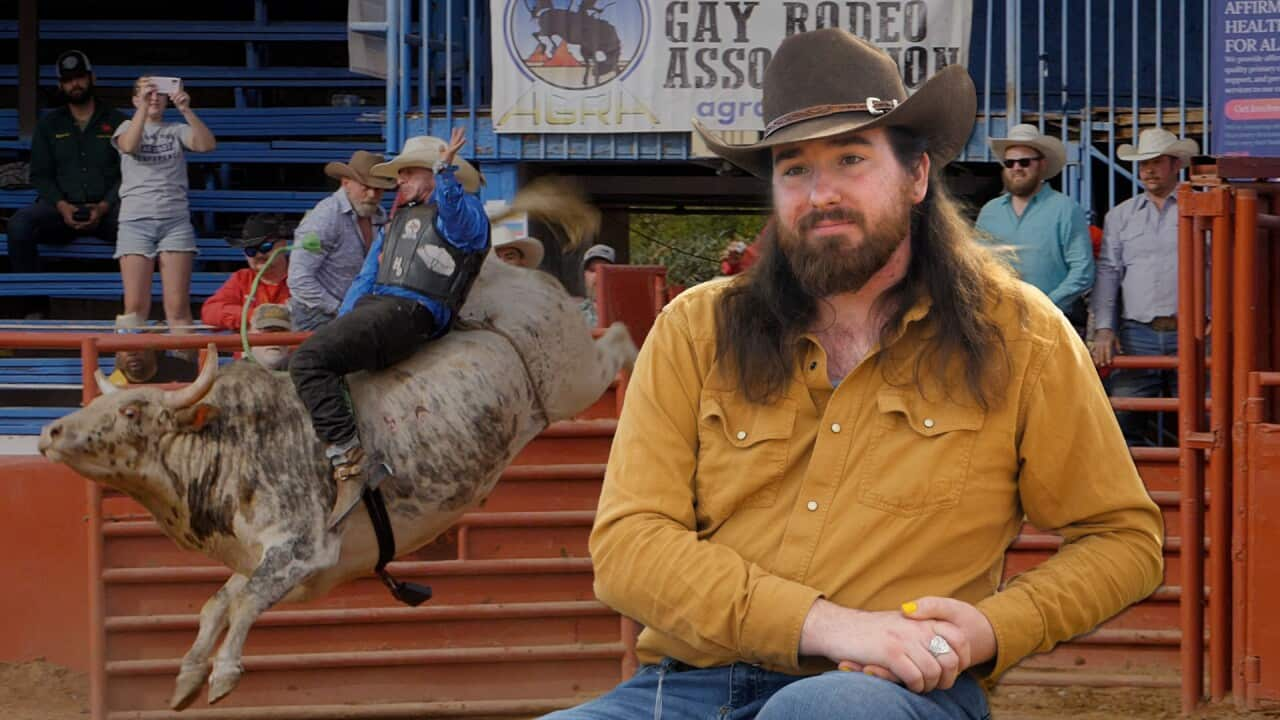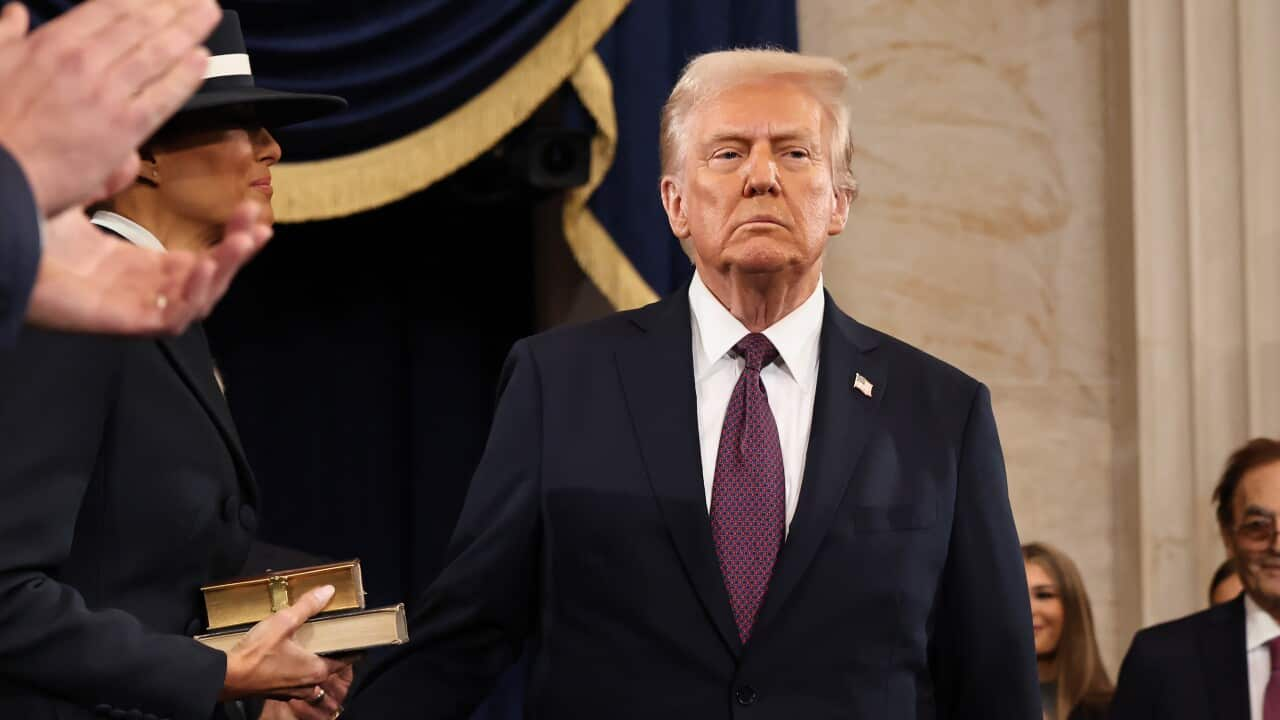Watch Dateline’s latest episode from the largest gay rodeo in the United States on SBS On Demand.
Stream free On Demand

America's Gay Rodeo
episode • Dateline • News And Current Affairs • 28m
episode • Dateline • News And Current Affairs • 28m
In the dusty chutes of the Corona Ranch grounds on the outskirts of Phoenix, Arizona, Moss Scavenger waits patiently alongside a restless steer.
With their brightly painted fingernails wrapped around its horns, they prepare to burst into the arena, surrounded by pride flags and raving fans.
"Gay and rodeo have always gone together," Moss says. "You look at a cowboy with that fringe, and you tell me that's not a little gay."
It’s Moss’s first time competing in a rodeo. Over the next two days, they’ll compete for a coveted Arizona belt buckle against dozens of ropers, wranglers and riders who have come from all over the country.

Gay rodeos started in the 1970s to create a more inclusive space and raise funds for LGBTIQ+ causes while engaging in one of America's favourite traditions. Source: SBS / Josh McAtamney
Moss identifies as gender fluid, calling themselves 'a cowbabe'. The main event they came for is called chute dogging, where contestants put a steer in a headlock, drag the animal over a white line, then try and wrestle it to the ground as quickly as they can.
Hailing from the Jersey Shore on the eastern coast, they’re an animal rescue officer by day — a job with skills easily transferred to the rodeo, they say.
For 40 years, Arizona’s gay rodeo — one of the largest in the US — has provided a safe space for LGBTIQ+ folks like Moss to enjoy one of America’s favourite pastimes.

Since the 1970s, gay rodeos have provided an inclusive space to people of all sexual orientations and raised funds for LGBTIQ+ causes. Source: SBS / Josh McAtamney
Among his first acts, : recognising only two biological sexes, male and female; dismantling federal programs aimed at promoting diversity, equity, and inclusion in the workplace; and banning transgender people from the military and trans athletes from women’s sports.
With the LGBTIQ+ community in the crosshairs of the Trump administration, Moss says spaces like gay rodeos are needed now more than ever.
"All the queer communities in the US right now are looking for more community to build up," Moss says.
"That's one of the reasons why there's so many people at this event competing, because it feels safe inside these gates."
LGBTIQ+ rights under threat
The American Civil Liberties Union (ACLU) tracks bills targeting LGBTIQ+ rights across the country. The group is currently monitoring 575 ‘anti-LGBTQ’ proposed bills, over 400 of which are progressing across the states. Among them, bathroom bans and barriers to accurate IDs for transgender people.
Critics say the new administration’s focus has emboldened state lawmakers to repeal the remaining civil rights of the LGBTIQ+ community.

Arizona State senator John Kavanagh has introduced 73 bills, which critics called 'anti-LGBTQI', during his nearly two decades in office. Source: SBS / Josh McAtamney
"This is all about respecting modesty, respecting the rights of school personnel ... respecting parental rights and safeguarding children by not having schools engage in gender transitioning," he says.
Kavanagh says his policies echo the Republican Party line.
"This is confined to the transgender issue," says Kavanagh.
"Even Trump has not made even a suggestion that it’s going beyond that."
This argument has divided the gay rodeo community into those who support trans rights and gender fluidity and those who don’t, says Moss.

For decades, gay rodeos provided a safe and inclusive space for LGBTIQ+ people and raised funds for the community causes. Source: SBS / Josh McAtamney
"Sometimes they're still very black-and-white binary."
Backsliding
Veteran organisers still keep a tight rein on how gender identity is expressed at the Arizona Gay Rodeo.
For example, competitors can self-select their gender, but men and women still compete separately.
Over the decades, there have been changes to how the gay rodeo runs, and even more significant progress in how it's received by the broader community.
Richard, who asked to only use his first name, recalls the inaugural Arizona gay rodeo in 1986. The owner of the largest hat store in the state, he was one of just two vendors at the event.

Richard, the owner of the largest hat store in Phoenix, says he still faces violence because of his LGBTIQ+ allyship. Source: SBS / Josh McAtamney
While Phoenix is a much more tolerant place now, he says he still faces violence because of his LGBTIQ+ allyship. A few years ago, he found the front door of his store smashed and a homophobic slur spray-painted on the wall.
He says he’s witnessed a rise in violence since Trump’s re-election.
"I even had one guy from Texas trying to take me out in the parking lot and beat me up because I wouldn't say I supported Donald Trump."
LGBTIQ+ Australians seeking support with mental health can contact QLife on 1800 184 527 or visit .
also has a list of support services.




